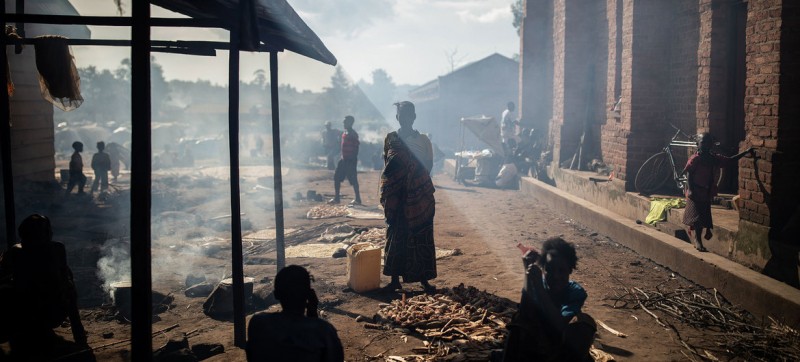Families shelter at a church that is being used as a temporary site for internally displaced people in Ituri, Democratic of the Congo. The UN refugee Agency, UNHCR, is “appalled by a series of deadly attacks” on displaced people in eastern Democratic Republic of the Congo (DRC), the agency’s spokesperson told journalists on Tuesday in Geneva. In the latest incident carried out by armed groups, UNHCR spokesperson Boris Cheshirkov cited local authorities in saying that 26 people were killed on Sunday at Ndjala site in the Drodro health zone in Ituri province. “Ten women and nine children were among the dead and 11 people were wounded. The attackers used guns, machetes and knives”, he told journalists at the UN in Geneva.
We are appalled by a series of deadly attacks by armed groups on displaced people in eastern DRC.
Desperate needs of those impacted include food, shelter, health care and psychosocial assistance.https://t.co/UsvWEXY2TB
— Le HCR en RDC (@UNHCR_DRC) November 30, 2021
Since 19 November, this is the fourth attack on IDPs in Ituri Province – host to 1.7 million displaced people.
‘Shocked, outraged’
UN Humanitarian Coordinator in the DRC David McLachlan-Karr expressed his anger, saying, “I am shocked, outraged and deeply saddened by these repeated attacks on civilians who are forced to leave their homes to seek safety from the violence”.
“It is imperative to protect these populations. I reiterate that these women, men and children must be allowed to live in peace”, he underscored.
The UN official reminded that the attacks are “violations of international humanitarian law and the 2009 Kampala Convention on IDPs”.
“They must stop immediately. I don’t want to count anymore the number of attacks that these vulnerable people are already enduring”, he said.
Humanitarian aid is being deployed rapidly to assist them.
On 21 November, a militia group attacked Drodro, another site for displaced people, leaving 44 dead and over 1,200 shelters destroyed. The also attacked a site at Tché, wrecking almost 1,000 shelters, according to authorities.
As many as 20,000 inhabitants fled to Rhoe, seeking safety near the military base of the UN Stabilization Mission in the DRC (MONUSCO), which doubled in size from 21,000 to 40,500 in under 48 hours – forcing the newly arrived families to sleep in the open.
The main needs are food, shelter, health care and psychosocial assistance.
Insecurity rife
On 14 November, in the country’s east, an armed group attacked a displaced people’s site at Mikenge town in South Kivu, killing six children and a pregnant woman while wounding eight others by machetes and bullets.
The inhabitants fled and their shelters were destroyed.
The attacks, which stem in part from inter-communal tensions, compound problems faced by people who are internally displaced.
The theft of livestock, which often accompanies the raids, deepens economic insecurity and the violence adds to the distress of people who have been forced to flee their homes at least once. It also instills fear in local populations.
Staggering numbers
A staggering 5.6 million people have been forced to flee their homes in the DRC, an increase of 400,000 people compared to early 2021.
While the majority live among host communities, more than 330,000 are sheltered in displacement sites.
“UNHCR calls on all parties to respect the civilian and humanitarian character of displacement sites, where both IDPs and the local population are being attacked in their homes…[and] to ensure access to the locations so that humanitarian actors can provide essential assistance”, said Mr. Cheshirkov.
The UN refugee agency is seeking further financial support for its underfunded operations to better support IDPs.
“We have received just 52 per cent of the $204.8 million required to provide life-saving assistance to people of concern in DRC”, the UNCHR spokesperson updated the journalists.

More than 300,000 people have been displaced across eastern Democratic Republic of the Congo (DRC) since early June 2019.




Comments are closed.